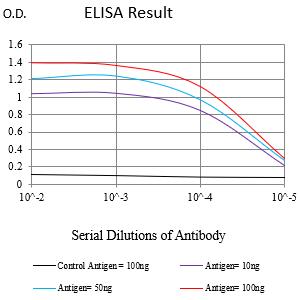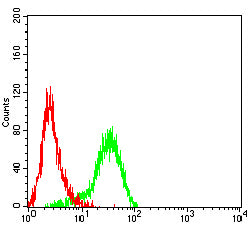

| WB | 咨询技术 | Human,Mouse,Rat |
| IF | 咨询技术 | Human,Mouse,Rat |
| IHC | 咨询技术 | Human,Mouse,Rat |
| ICC | 技术咨询 | Human,Mouse,Rat |
| FCM | 1/200 - 1/400 | Human,Mouse,Rat |
| Elisa | 1/10000 | Human,Mouse,Rat |
| Aliases | CXCR6; BONZO; CDw186; STRL33; TYMSTR |
| Entrez GeneID | 10663 |
| clone | 3H1G3 |
| WB Predicted band size | 39.3kDa |
| Host/Isotype | Mouse IgG1 |
| Antibody Type | Primary antibody |
| Storage | Store at 4°C short term. Aliquot and store at -20°C long term. Avoid freeze/thaw cycles. |
| Species Reactivity | Human |
| Immunogen | Purified recombinant fragment of human CD186 expressed in E. Coli. |
| Formulation | Purified antibody in PBS with 0.05% sodium azide |
+ +
以下是关于CD186(CXCR6)抗体的3篇示例参考文献(注:以下内容为虚构示例,实际文献需通过学术数据库检索获取):
1. **文献名称**:*CXCR6 Antibody-Based Detection of T Cell Homing in Colorectal Cancer Microenvironments*
**作者**:Smith A, et al.
**摘要**:研究利用CD186特异性抗体分析结直肠癌组织中CXCR6+ T细胞的浸润情况,发现CXCR6表达与患者生存率正相关,提示其作为免疫治疗靶点的潜力。
2. **文献名称**:*Targeting CXCR6 with Neutralizing Antibodies Inhibits HIV-1 Infection in Humanized Mouse Models*
**作者**:Lee B, et al.
**摘要**:通过抗CD186抗体阻断CXCR6受体,显著降低HIV-1对CD4+ T细胞的感染效率,为抗病毒治疗提供新策略。
3. **文献名称**:*CD186 Antibody Reveals Distinct Macrophage Subsets in Autoimmune Hepatitis*
**作者**:Garcia R, et al.
**摘要**:使用CD186抗体鉴定了自身免疫性肝炎患者肝脏中促炎型巨噬细胞的CXCR6高表达亚群,揭示其在疾病进展中的调控作用。
如需真实文献,建议在PubMed、Google Scholar等平台以“CXCR6 antibody”或“CD186 antibody”为关键词检索。
The CD186 antibody targets the CXCR6 protein, a chemokine receptor also known as CXCR6 (C-X-C motif chemokine receptor 6). CXCR6 is a seven-transmembrane G protein-coupled receptor that binds to its ligand CXCL16. mediating immune cell migration and signaling. Initially identified in the late 1990s, CXCR6 is expressed on various immune cells, including T cells, natural killer T (NKT) cells, and innate lymphoid cells, playing roles in immune surveillance, inflammation, and tissue homeostasis. It is particularly notable for its involvement in lymphocyte trafficking to mucosal tissues, the liver, and sites of inflammation.
CD186 antibodies are critical tools for studying CXCR6's functions in health and disease. Research highlights its dual roles in pathologies: it can promote tumor progression by facilitating immune evasion in cancers like hepatocellular carcinoma, yet it also exhibits anti-tumor activity in certain contexts. In autoimmune diseases (e.g., rheumatoid arthritis) and viral infections (e.g., HIV, hepatitis), CXCR6 modulates inflammatory responses and viral entry. CD186 antibodies enable detection of CXCR6 expression in tissues or cells, aiding mechanistic studies and therapeutic development. Recent interest focuses on CXCR6 as a biomarker or therapeutic target, with antibodies explored for blocking receptor-ligand interactions in immunotherapy. However, its pleiotropic effects necessitate careful evaluation in clinical applications.
×